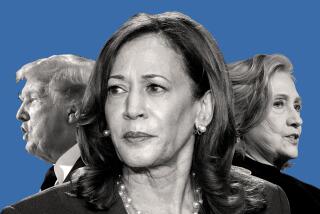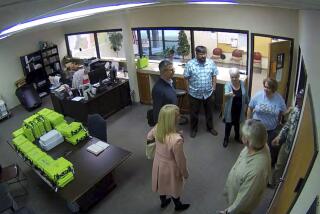Stung by Attack, Hill Legal Team Uses Lie Detector : Tactics: Risk is taken after Thomas backers score point after point. Attorney turns to an old adversary for help in setting up the test.
- Share via
WASHINGTON — Caught off-guard by the ferocity of the counterattack Saturday by Clarence Thomas and his supporters on the Senate Judiciary Committee, Anita Faye Hill’s chief lawyer turned to an old adversary to help him establish a surprise of his own.
All day long, Charles Ogletree and his legal team had watched helplessly as Thomas and his backers scored point after point by accusing unnamed liberal groups of racism and of spicing up Hill’s sexual harassment charges by taking material from a legal decision and a best-selling book.
“We were beginning to understand that members of the committee were willing to accuse her of ‘flat-out perjury,’ and of fantasizing about a relationship with Clarence Thomas,” said Emma Coleman Jordan, a Georgetown University law professor and a team member. “They were using unfair tactics,” but the damage was piling up, she said.
“We finally sat down and thought through how to go about re-establishing Anita’s credibility,” Jordan recalled in an interview Sunday evening.
Then Hill’s legal team voted unanimously to take a risk. They decided to ask her if she was still willing to take a lie detector test.
“Every trial lawyer believes in his or her client, but it’s still a risk,” Jordan said.
When Ogletree called Hill about taking a lie detector test, the University of Oklahoma law professor did not hesitate in her response.
“I’ll take it whenever you set it up,” she told him. “I stand by my offer.”
Wasting no time, Ogletree, a onetime District of Columbia public defender, called an old adversary, Washington attorney Charles C. F. Ruff, once the U.S. attorney here and a former member of the Watergate special prosecution team.
Ogletree asked Ruff to recommend a polygraph expert “with impeccable credentials.”
Ruff, a recent president of the D. C. Bar Assn., immediately had someone in mind: Paul K. Minor. From 1978 to 1987, Minor was head of the FBI’s polygraph program and had trained hundreds of agents. He now has his own business in suburban Fairfax County, Va.
“This is a man who would call them as he saw them,” Ruff told Ogletree.
Ogletree, a Harvard Law School faculty member, contacted Minor on Saturday evening and they agreed to meet Sunday morning at Ruff’s office.
On Friday, Hill told the committee that she had expressed a willingness to take a lie detector test when interviewed by two FBI agents who were investigating her allegations against Thomas. But the FBI never got back to her, she said.
“We feared that some members of the committee may have forgotten about that,” Jordan said. “And we thought it would be important to bring that back to public attention.”
At 11 a.m. Sunday, Ogletree presented Hill to Minor. He took more than an hour explaining the procedure to Hill, asking about her date of birth, Social Security number and other basic information.
Minor then put Hill through four phases of questioning, including questions that are central to her allegations against Thomas--such as whether she ever “deliberately lied” about Thomas, or about his having discussed pornography with her and talking about the size of his penis.
“She answered no to all the questions,” Minor said at a hastily called press conference Sunday afternoon just outside the Senate Caucus Room where the committee was holding its hearings.
“There was no indication of deception,” Minor said. “My opinion is that Miss Hill was truthful.”
Hill’s advisers told Sen. Joseph R. Biden Jr. (D-Del.), the committee chairman, of their intention to give Hill a lie detector test, Jordan said. They also informed him of the results.
But when Ogletree announced the results publicly, just as the crowd of reporters was leaving the caucus room during a break, the disclosure caused an uproar, prompting the committee to stretch a five-minute recess to an hour.
The disclosure also prompted some Hill supporters to demand that Thomas undergo a similar test. “I think it would be appropriate to ask,” said Eleanor Smeal, head of the National Organization for Women.
And if Hill had not passed the polygraph test?
“We were prepared to deal with that,” Jordan said, refusing to elaborate.
More to Read
Get the L.A. Times Politics newsletter
Deeply reported insights into legislation, politics and policy from Sacramento, Washington and beyond. In your inbox twice per week.
You may occasionally receive promotional content from the Los Angeles Times.










